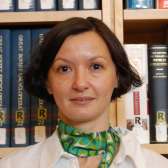
"Memories of the Second World War in Croatia"
Professional Background
Biljana Bijelic received an M.A. in international studies at the University of Washington and a B.A. in special education at the University of Zagreb. During her fellowship at the Museum, she was a Ph.D. candidate in history at the University of Toronto. For her Charles H. Revson Foundation Fellowship for Archival Research, Ms. Bijelic conducted research for her project, “Memories of the Second World War in Croatia.”
Ms. Bijelic is the author of “Women on the Edge of Gender Equality,” in Croatia Since 1989: Society and Media, edited by Sabrina Ramet and Daborka Matic (Texas A&M Press, 2007); “Nationalism, Motherhood and the Reordering of Women’s Power,” in Serbia Since 1989: Politics and Society under Milosevic and After, edited by Sabrina Ramet and Vjeran Pavlakovic (University of Washington Press, 2005); and “Balkans, Stereotypes, Violence and Responsibility,” in Facing the Past, Facing the Future: Confronting Ethnicity and Conflict in Bosnia and Former Yugoslavia, edited by Florian Bieber and Carsten Wieland (Longo Editore Ravenna, A Series of Balkan and East European Studies, University of Bologna, 2005), among other articles. She has presented her work at several conferences in the United States and Europe. Ms. Bijelic is the recipient of a Global Supplementary Grant from the Open Society Institute in New York, and a Ron Brown Fellowship from the U.S. Department of State.
Fellowship Research
During her tenure at the Center, Ms. Bijelic researched the political instrumentalization of traumatic memory in the initial decades of postwar Yugoslav socialism. Specifically, she historicized the conflict between Serbs and Croats in Croatia and gave an account of Ustase World War II crimes. Her research revealed the mechanisms by which Serbs and Croats presented themselves as the both victims and perpetrators of historical injustices in the Yugoslav Kingdom and in Socialist Yugoslavia. She used several archival collections at the Museum to conduct her research, including the former Yugoslavia’s State Commission records, Military Court Records from Zagreb, and Government in Exile Records.
Ms. Bijelic was in residence at the Mandel Center from Apri1 1 to September 30, 2008.
